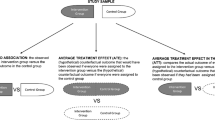Abstract
Most of the debate surrounding standards in medical care, issues of medical audit and what constitutes benefit from health care assumes that what is obtained from health care is health and only that. This is an assumption which most health economists at least implicitly appear to endorse. This paper questions that assumption. There are various outcomes beyond health and there are various processes involved in health care about which patients are not indifferent. This paper calls for a fuller investigation as to what it is that patients want from their health services and the adoption of a more pluralistic conception of health care benefits. It is further argued that the objectives of health care systems are those in which citizensqua citizens also have interests and which may be different from those of patients. It is yet less likely that citizens’ interests in health care will be restricted to health.
Similar content being viewed by others
References
Culyer, A.J. (1988). Inequalities of health services are in general, desirable. In,Acceptable Inequalities? Essays in Pursuit of Equality in Health Care, ed. by D.G. Green, IEA, London.
Sackett, D.L. and Rosenberg, W.M.C. (1995). On the need for evidence-based medicine.Health Economics 4, 330–334.
Shiell, A. (1997). Health outcomes are about choices and values.Health Policy 39, 5–15.
Williams, A. (1985). Economics of coronary artery bypass grafting.British Medical Journal 291, 326–329.
Grossman, M. (1972). On the concept of health capital and the demand for health.Journal of Political Economy 80, 223–255.
Honderich, T. (1995).The Oxford Companion to Philosophy, Oxford University Press, Oxford.
Lancaster, K. (1966). A new approach to consumer theory.Journal of Political Economy 74, 132–157.
Dowie, J. (1993). Process utility can seriously damage your health evaluation but the generic measure of benefit should include ‘service outcomes’. Paper presented at the Health Economists’ Study Group Meeting, Glasgow, June 1993.
Salkeld, G. (1998). What are the benefits of preventive health care?Health Care Analysis 6, 106–112.
Cox, E. (1995).A Truly Civil Society, ABC, Sydney.
Mooney, G. (1994).Key Issues in Health Economics, Wheatsheaf, Hemel Hempstead.
Mooney, G. (1996). A communitarian critique of health (care) economics. Paper presented at the iHEA Conference, Vancouver, May.
Donaldson, C., Shackley, P., Abdalam, M. and Miedzybrodzka, Z. (1995). Willingness to pay for antenatal carrier screening for cystic fibrosis.Health Economics 4, 439–452.
Ryan, M. (1995).Economics and the Patient’s Utility Function: An Application to Assisted Reproductive Techniques. PhD Thesis, University of Aberdeen, Aberdeen.
Mooney, G. and Lange, M. (1993). Ante-natal screening: what constitutes benefit?Social Science and Medicine 37, 873–878.
Berwick, D.M. and Weinstein, M.C. (1985). What do patients value? Willingness to pay for ultrasound in normal pregnancy.Medicare 23, 881–893.
Holli, K, and Hakama, M. (1989). Treatment of the terminal stages of breat cancer.British Medical Journal 218, 13–14.
Holli, K., Hakama, M. and Mooney, G. (1990). Changing clinical practice: a case study in breast cancer. In,Changing Values in Medical and Health Care Decision Making, ed. by U.J. Jensen and G. Mooney, John Wiley, London.
Ryan, M. (1996). Using willingness to pay to assess the benefits of assisted reproductive techniques.Health Economics 5(6), 543–558.
Nord, E., Richardson, J., Street, A., Kuhse, H. and Singer, P. (1995). Maximising health benefits versus egalitarianism: an Australian survey of health issues.Social Science and Medicine 41(10), 1429–1438.
Dowie, J. (1997). Clinical trials and economic evaluations? No, there are only evaluations.Health Economics 6, 87–89.
Abelson, J., Lomas, J., Eyles, J., Birch, S. and Veenstra, G. (1995). Does the community want develved authority? Results of deliberative polling in Ontario.Canadian Medical Association Journal 153(4), 403–412.
Author information
Authors and Affiliations
Rights and permissions
About this article
Cite this article
Mooney, G. Beyond health outcomes: The benefits of health care. Health Care Anal 6, 99–105 (1998). https://doi.org/10.1007/BF02678115
Issue Date:
DOI: https://doi.org/10.1007/BF02678115




